Business Law Assignment : NSW
VerifiedAdded on 2021/05/31
|9
|2347
|40
AI Summary
Contribute Materials
Your contribution can guide someone’s learning journey. Share your
documents today.
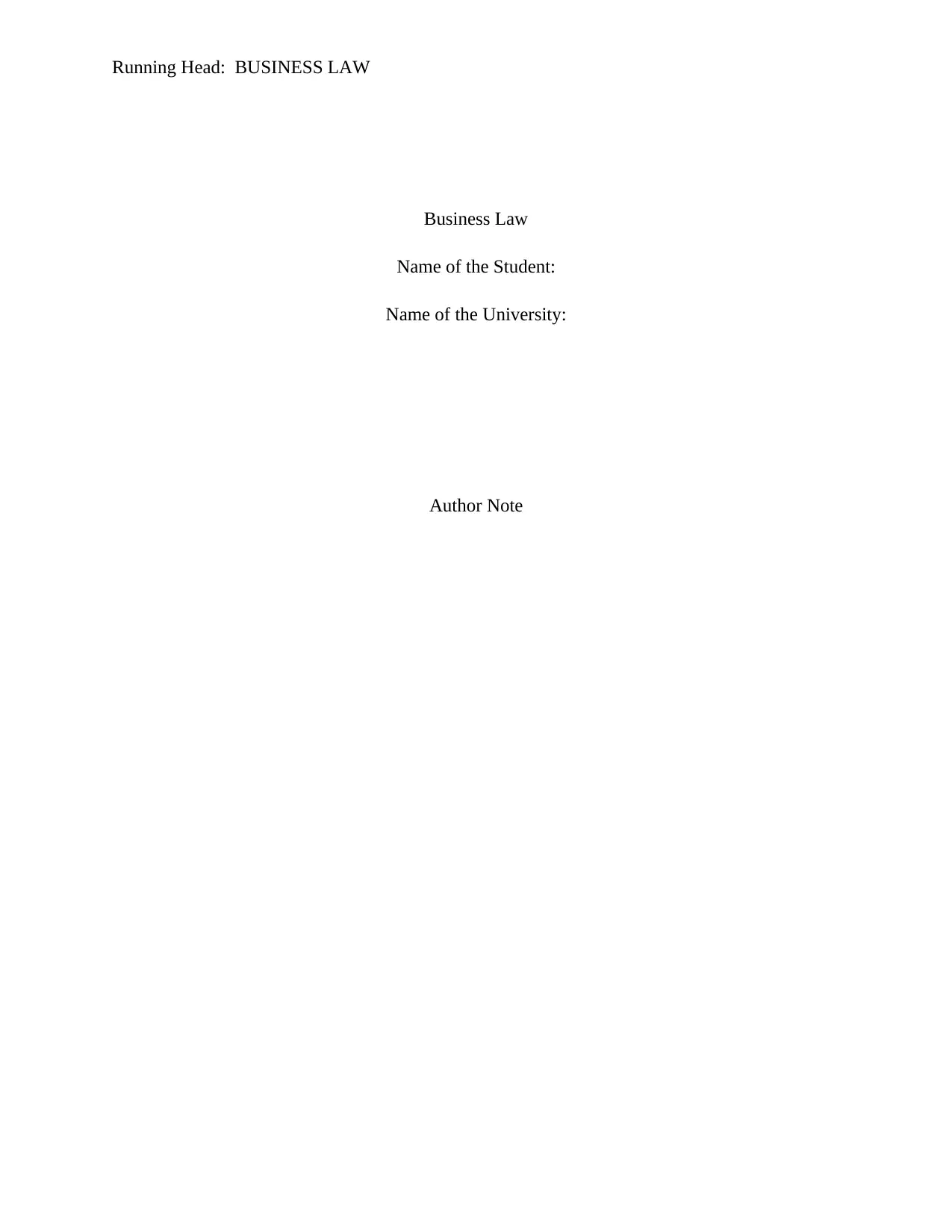
Running Head: BUSINESS LAW
Business Law
Name of the Student:
Name of the University:
Author Note
Business Law
Name of the Student:
Name of the University:
Author Note
Secure Best Marks with AI Grader
Need help grading? Try our AI Grader for instant feedback on your assignments.
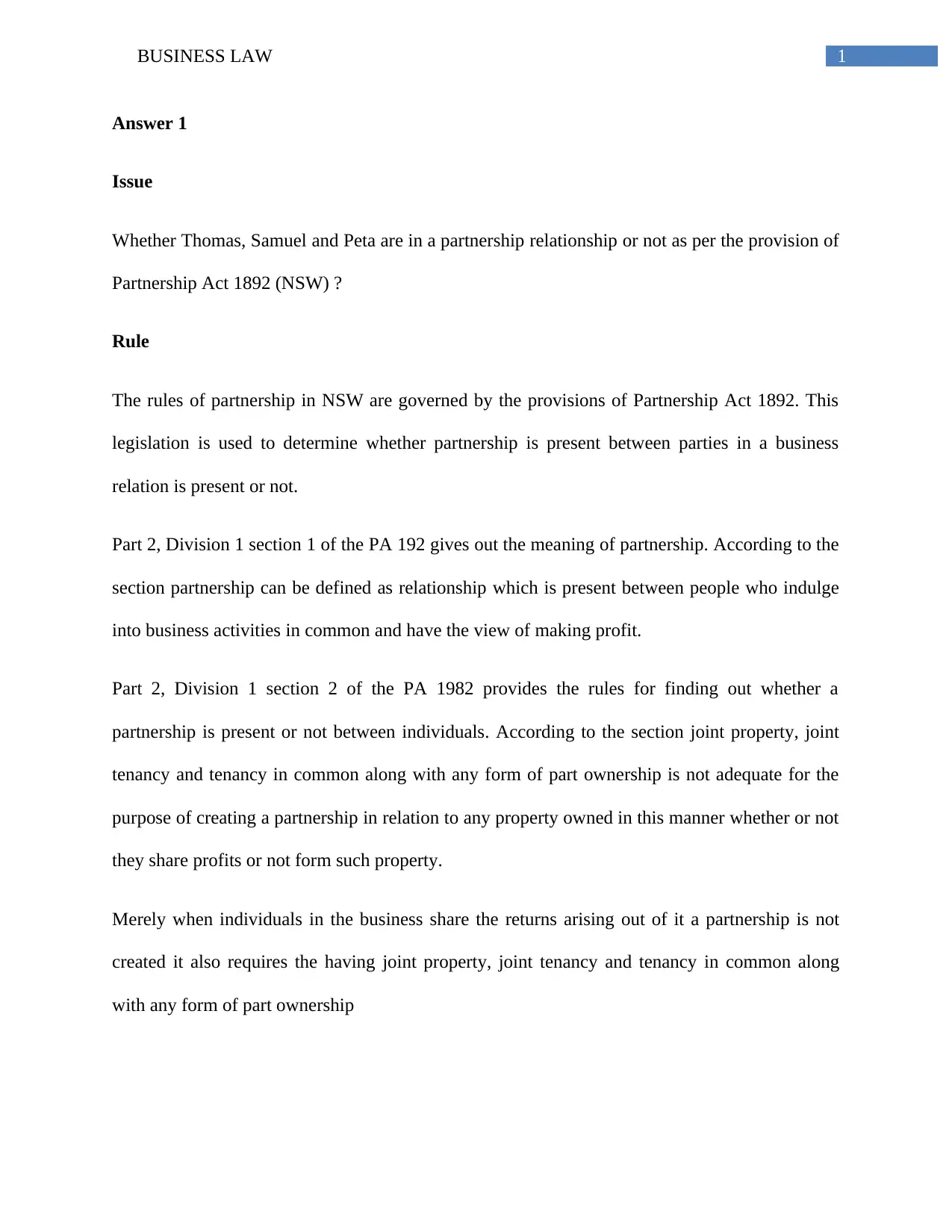
1BUSINESS LAW
Answer 1
Issue
Whether Thomas, Samuel and Peta are in a partnership relationship or not as per the provision of
Partnership Act 1892 (NSW) ?
Rule
The rules of partnership in NSW are governed by the provisions of Partnership Act 1892. This
legislation is used to determine whether partnership is present between parties in a business
relation is present or not.
Part 2, Division 1 section 1 of the PA 192 gives out the meaning of partnership. According to the
section partnership can be defined as relationship which is present between people who indulge
into business activities in common and have the view of making profit.
Part 2, Division 1 section 2 of the PA 1982 provides the rules for finding out whether a
partnership is present or not between individuals. According to the section joint property, joint
tenancy and tenancy in common along with any form of part ownership is not adequate for the
purpose of creating a partnership in relation to any property owned in this manner whether or not
they share profits or not form such property.
Merely when individuals in the business share the returns arising out of it a partnership is not
created it also requires the having joint property, joint tenancy and tenancy in common along
with any form of part ownership
Answer 1
Issue
Whether Thomas, Samuel and Peta are in a partnership relationship or not as per the provision of
Partnership Act 1892 (NSW) ?
Rule
The rules of partnership in NSW are governed by the provisions of Partnership Act 1892. This
legislation is used to determine whether partnership is present between parties in a business
relation is present or not.
Part 2, Division 1 section 1 of the PA 192 gives out the meaning of partnership. According to the
section partnership can be defined as relationship which is present between people who indulge
into business activities in common and have the view of making profit.
Part 2, Division 1 section 2 of the PA 1982 provides the rules for finding out whether a
partnership is present or not between individuals. According to the section joint property, joint
tenancy and tenancy in common along with any form of part ownership is not adequate for the
purpose of creating a partnership in relation to any property owned in this manner whether or not
they share profits or not form such property.
Merely when individuals in the business share the returns arising out of it a partnership is not
created it also requires the having joint property, joint tenancy and tenancy in common along
with any form of part ownership
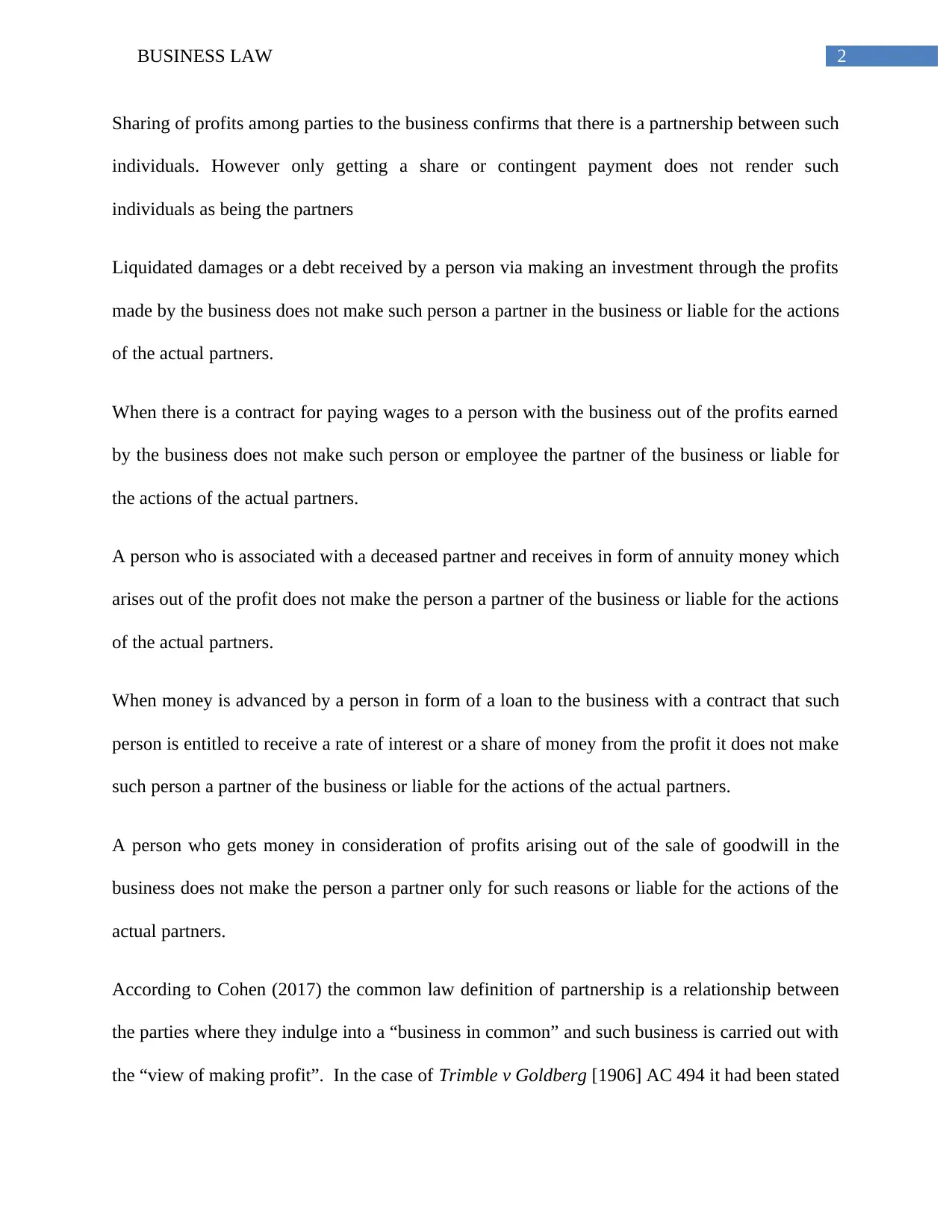
2BUSINESS LAW
Sharing of profits among parties to the business confirms that there is a partnership between such
individuals. However only getting a share or contingent payment does not render such
individuals as being the partners
Liquidated damages or a debt received by a person via making an investment through the profits
made by the business does not make such person a partner in the business or liable for the actions
of the actual partners.
When there is a contract for paying wages to a person with the business out of the profits earned
by the business does not make such person or employee the partner of the business or liable for
the actions of the actual partners.
A person who is associated with a deceased partner and receives in form of annuity money which
arises out of the profit does not make the person a partner of the business or liable for the actions
of the actual partners.
When money is advanced by a person in form of a loan to the business with a contract that such
person is entitled to receive a rate of interest or a share of money from the profit it does not make
such person a partner of the business or liable for the actions of the actual partners.
A person who gets money in consideration of profits arising out of the sale of goodwill in the
business does not make the person a partner only for such reasons or liable for the actions of the
actual partners.
According to Cohen (2017) the common law definition of partnership is a relationship between
the parties where they indulge into a “business in common” and such business is carried out with
the “view of making profit”. In the case of Trimble v Goldberg [1906] AC 494 it had been stated
Sharing of profits among parties to the business confirms that there is a partnership between such
individuals. However only getting a share or contingent payment does not render such
individuals as being the partners
Liquidated damages or a debt received by a person via making an investment through the profits
made by the business does not make such person a partner in the business or liable for the actions
of the actual partners.
When there is a contract for paying wages to a person with the business out of the profits earned
by the business does not make such person or employee the partner of the business or liable for
the actions of the actual partners.
A person who is associated with a deceased partner and receives in form of annuity money which
arises out of the profit does not make the person a partner of the business or liable for the actions
of the actual partners.
When money is advanced by a person in form of a loan to the business with a contract that such
person is entitled to receive a rate of interest or a share of money from the profit it does not make
such person a partner of the business or liable for the actions of the actual partners.
A person who gets money in consideration of profits arising out of the sale of goodwill in the
business does not make the person a partner only for such reasons or liable for the actions of the
actual partners.
According to Cohen (2017) the common law definition of partnership is a relationship between
the parties where they indulge into a “business in common” and such business is carried out with
the “view of making profit”. In the case of Trimble v Goldberg [1906] AC 494 it had been stated
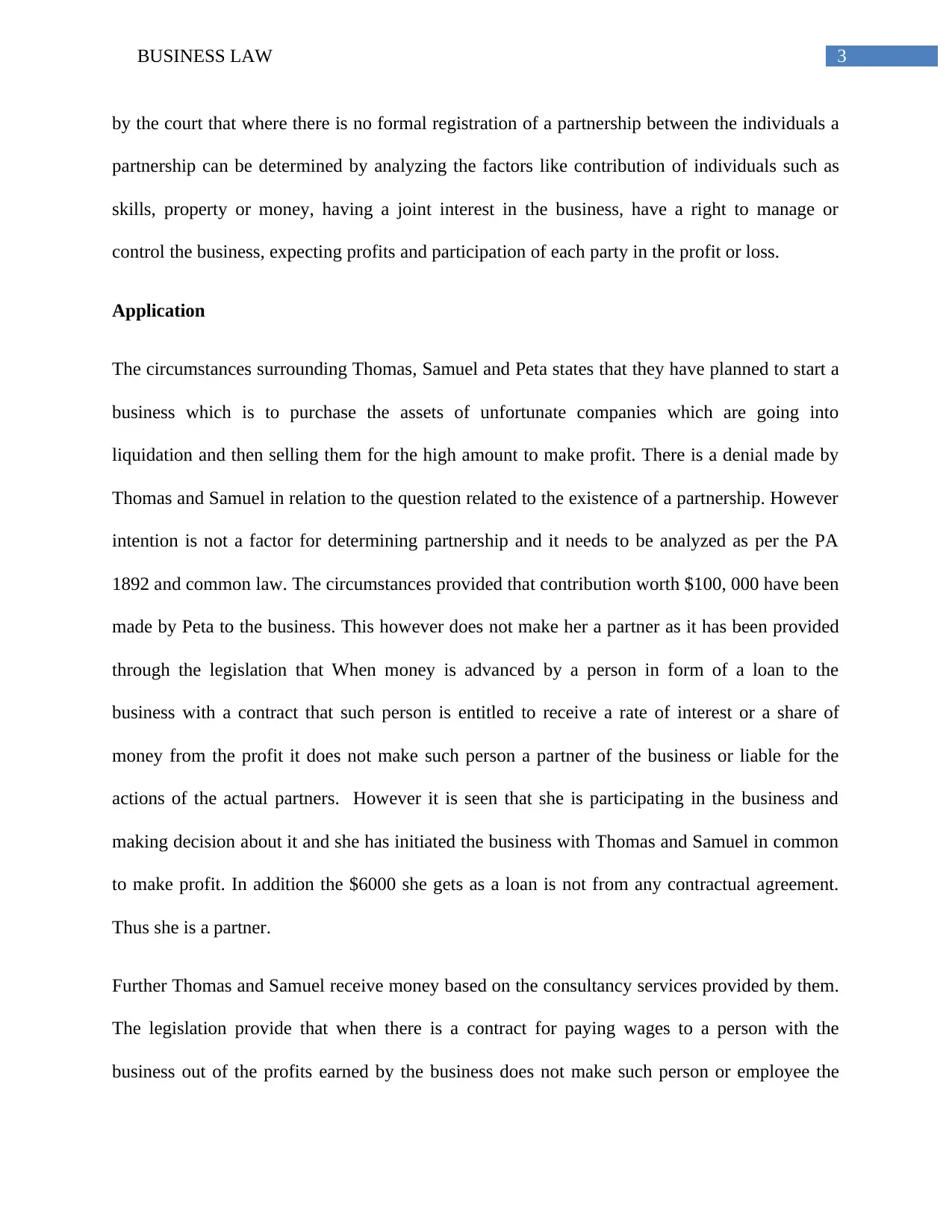
3BUSINESS LAW
by the court that where there is no formal registration of a partnership between the individuals a
partnership can be determined by analyzing the factors like contribution of individuals such as
skills, property or money, having a joint interest in the business, have a right to manage or
control the business, expecting profits and participation of each party in the profit or loss.
Application
The circumstances surrounding Thomas, Samuel and Peta states that they have planned to start a
business which is to purchase the assets of unfortunate companies which are going into
liquidation and then selling them for the high amount to make profit. There is a denial made by
Thomas and Samuel in relation to the question related to the existence of a partnership. However
intention is not a factor for determining partnership and it needs to be analyzed as per the PA
1892 and common law. The circumstances provided that contribution worth $100, 000 have been
made by Peta to the business. This however does not make her a partner as it has been provided
through the legislation that When money is advanced by a person in form of a loan to the
business with a contract that such person is entitled to receive a rate of interest or a share of
money from the profit it does not make such person a partner of the business or liable for the
actions of the actual partners. However it is seen that she is participating in the business and
making decision about it and she has initiated the business with Thomas and Samuel in common
to make profit. In addition the $6000 she gets as a loan is not from any contractual agreement.
Thus she is a partner.
Further Thomas and Samuel receive money based on the consultancy services provided by them.
The legislation provide that when there is a contract for paying wages to a person with the
business out of the profits earned by the business does not make such person or employee the
by the court that where there is no formal registration of a partnership between the individuals a
partnership can be determined by analyzing the factors like contribution of individuals such as
skills, property or money, having a joint interest in the business, have a right to manage or
control the business, expecting profits and participation of each party in the profit or loss.
Application
The circumstances surrounding Thomas, Samuel and Peta states that they have planned to start a
business which is to purchase the assets of unfortunate companies which are going into
liquidation and then selling them for the high amount to make profit. There is a denial made by
Thomas and Samuel in relation to the question related to the existence of a partnership. However
intention is not a factor for determining partnership and it needs to be analyzed as per the PA
1892 and common law. The circumstances provided that contribution worth $100, 000 have been
made by Peta to the business. This however does not make her a partner as it has been provided
through the legislation that When money is advanced by a person in form of a loan to the
business with a contract that such person is entitled to receive a rate of interest or a share of
money from the profit it does not make such person a partner of the business or liable for the
actions of the actual partners. However it is seen that she is participating in the business and
making decision about it and she has initiated the business with Thomas and Samuel in common
to make profit. In addition the $6000 she gets as a loan is not from any contractual agreement.
Thus she is a partner.
Further Thomas and Samuel receive money based on the consultancy services provided by them.
The legislation provide that when there is a contract for paying wages to a person with the
business out of the profits earned by the business does not make such person or employee the
Secure Best Marks with AI Grader
Need help grading? Try our AI Grader for instant feedback on your assignments.
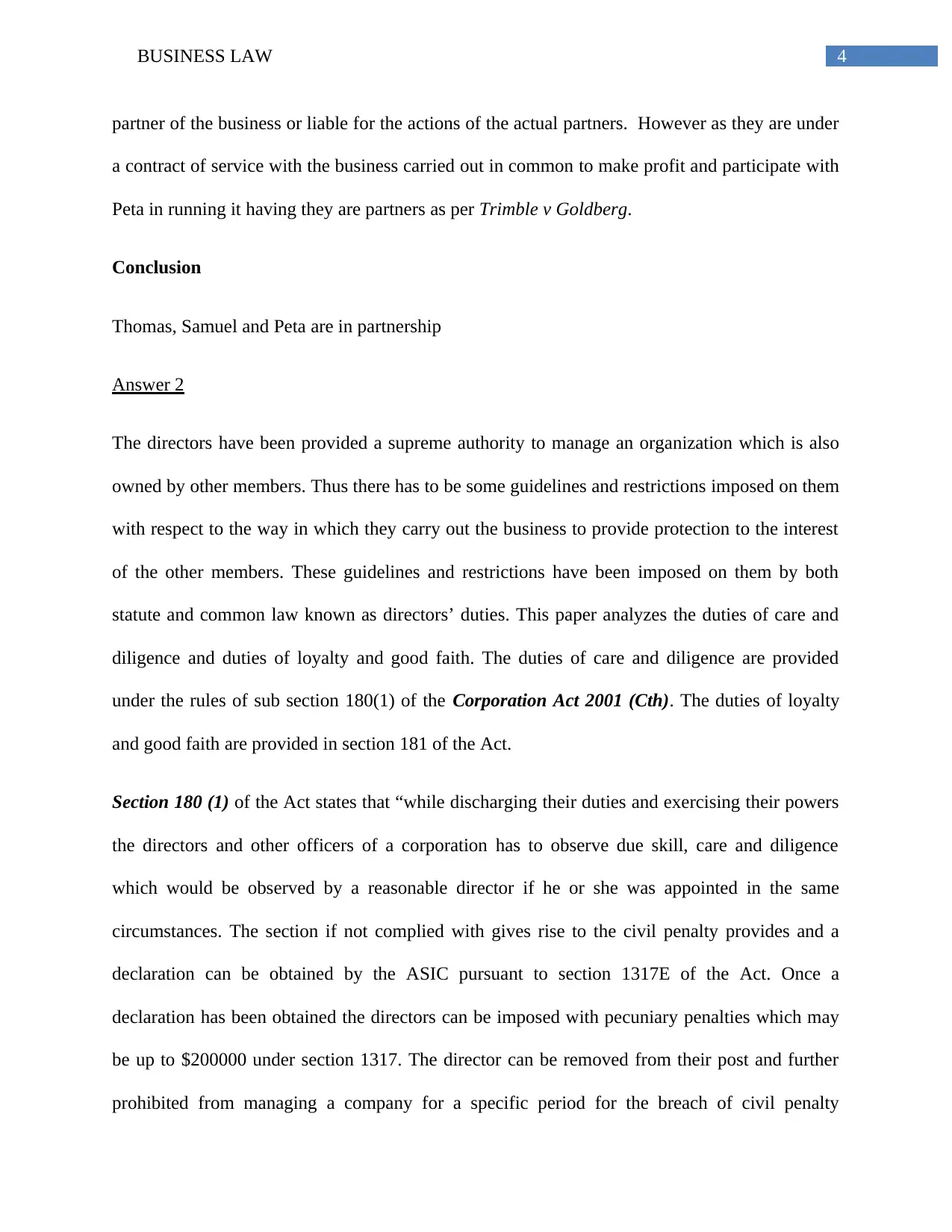
4BUSINESS LAW
partner of the business or liable for the actions of the actual partners. However as they are under
a contract of service with the business carried out in common to make profit and participate with
Peta in running it having they are partners as per Trimble v Goldberg.
Conclusion
Thomas, Samuel and Peta are in partnership
Answer 2
The directors have been provided a supreme authority to manage an organization which is also
owned by other members. Thus there has to be some guidelines and restrictions imposed on them
with respect to the way in which they carry out the business to provide protection to the interest
of the other members. These guidelines and restrictions have been imposed on them by both
statute and common law known as directors’ duties. This paper analyzes the duties of care and
diligence and duties of loyalty and good faith. The duties of care and diligence are provided
under the rules of sub section 180(1) of the Corporation Act 2001 (Cth). The duties of loyalty
and good faith are provided in section 181 of the Act.
Section 180 (1) of the Act states that “while discharging their duties and exercising their powers
the directors and other officers of a corporation has to observe due skill, care and diligence
which would be observed by a reasonable director if he or she was appointed in the same
circumstances. The section if not complied with gives rise to the civil penalty provides and a
declaration can be obtained by the ASIC pursuant to section 1317E of the Act. Once a
declaration has been obtained the directors can be imposed with pecuniary penalties which may
be up to $200000 under section 1317. The director can be removed from their post and further
prohibited from managing a company for a specific period for the breach of civil penalty
partner of the business or liable for the actions of the actual partners. However as they are under
a contract of service with the business carried out in common to make profit and participate with
Peta in running it having they are partners as per Trimble v Goldberg.
Conclusion
Thomas, Samuel and Peta are in partnership
Answer 2
The directors have been provided a supreme authority to manage an organization which is also
owned by other members. Thus there has to be some guidelines and restrictions imposed on them
with respect to the way in which they carry out the business to provide protection to the interest
of the other members. These guidelines and restrictions have been imposed on them by both
statute and common law known as directors’ duties. This paper analyzes the duties of care and
diligence and duties of loyalty and good faith. The duties of care and diligence are provided
under the rules of sub section 180(1) of the Corporation Act 2001 (Cth). The duties of loyalty
and good faith are provided in section 181 of the Act.
Section 180 (1) of the Act states that “while discharging their duties and exercising their powers
the directors and other officers of a corporation has to observe due skill, care and diligence
which would be observed by a reasonable director if he or she was appointed in the same
circumstances. The section if not complied with gives rise to the civil penalty provides and a
declaration can be obtained by the ASIC pursuant to section 1317E of the Act. Once a
declaration has been obtained the directors can be imposed with pecuniary penalties which may
be up to $200000 under section 1317. The director can be removed from their post and further
prohibited from managing a company for a specific period for the breach of civil penalty
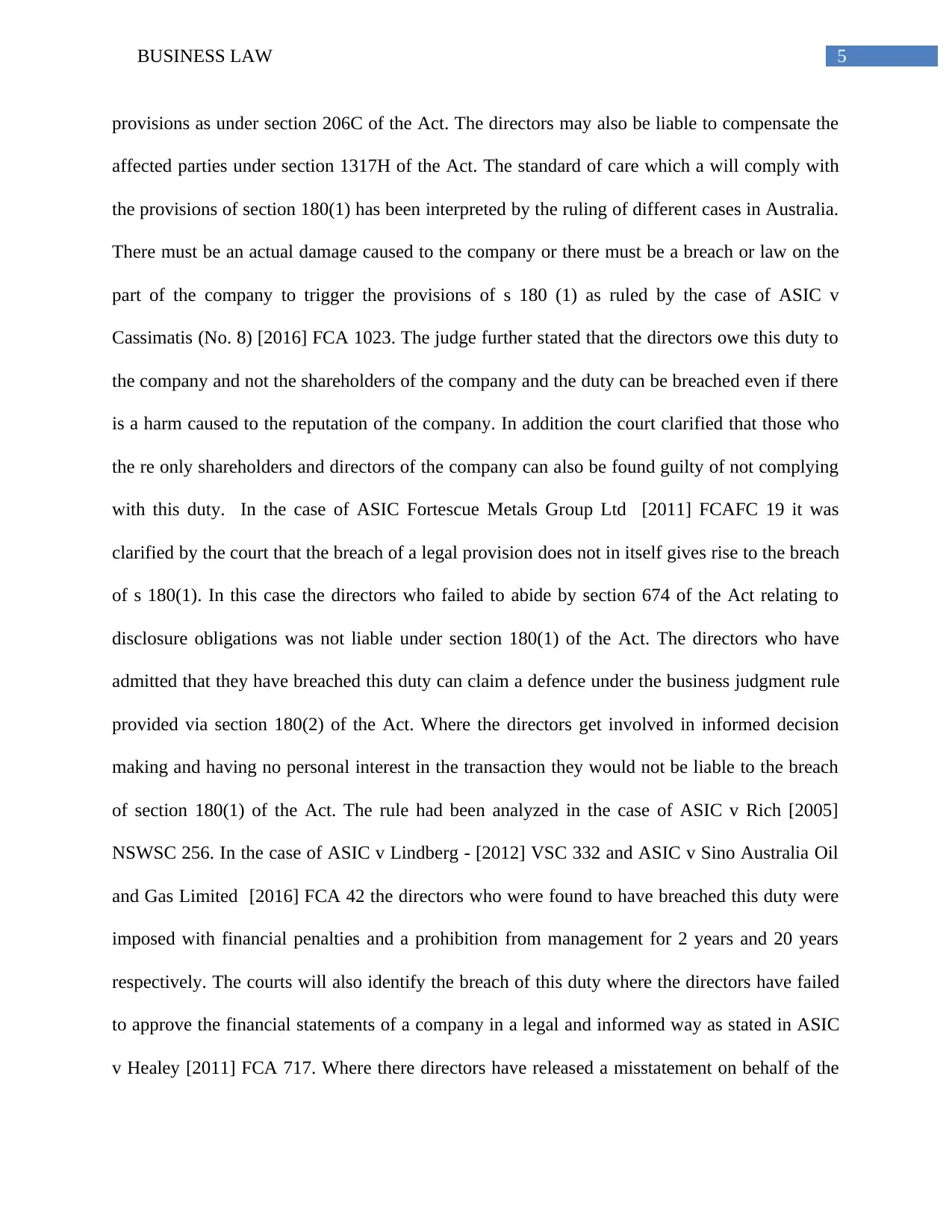
5BUSINESS LAW
provisions as under section 206C of the Act. The directors may also be liable to compensate the
affected parties under section 1317H of the Act. The standard of care which a will comply with
the provisions of section 180(1) has been interpreted by the ruling of different cases in Australia.
There must be an actual damage caused to the company or there must be a breach or law on the
part of the company to trigger the provisions of s 180 (1) as ruled by the case of ASIC v
Cassimatis (No. 8) [2016] FCA 1023. The judge further stated that the directors owe this duty to
the company and not the shareholders of the company and the duty can be breached even if there
is a harm caused to the reputation of the company. In addition the court clarified that those who
the re only shareholders and directors of the company can also be found guilty of not complying
with this duty. In the case of ASIC Fortescue Metals Group Ltd [2011] FCAFC 19 it was
clarified by the court that the breach of a legal provision does not in itself gives rise to the breach
of s 180(1). In this case the directors who failed to abide by section 674 of the Act relating to
disclosure obligations was not liable under section 180(1) of the Act. The directors who have
admitted that they have breached this duty can claim a defence under the business judgment rule
provided via section 180(2) of the Act. Where the directors get involved in informed decision
making and having no personal interest in the transaction they would not be liable to the breach
of section 180(1) of the Act. The rule had been analyzed in the case of ASIC v Rich [2005]
NSWSC 256. In the case of ASIC v Lindberg - [2012] VSC 332 and ASIC v Sino Australia Oil
and Gas Limited [2016] FCA 42 the directors who were found to have breached this duty were
imposed with financial penalties and a prohibition from management for 2 years and 20 years
respectively. The courts will also identify the breach of this duty where the directors have failed
to approve the financial statements of a company in a legal and informed way as stated in ASIC
v Healey [2011] FCA 717. Where there directors have released a misstatement on behalf of the
provisions as under section 206C of the Act. The directors may also be liable to compensate the
affected parties under section 1317H of the Act. The standard of care which a will comply with
the provisions of section 180(1) has been interpreted by the ruling of different cases in Australia.
There must be an actual damage caused to the company or there must be a breach or law on the
part of the company to trigger the provisions of s 180 (1) as ruled by the case of ASIC v
Cassimatis (No. 8) [2016] FCA 1023. The judge further stated that the directors owe this duty to
the company and not the shareholders of the company and the duty can be breached even if there
is a harm caused to the reputation of the company. In addition the court clarified that those who
the re only shareholders and directors of the company can also be found guilty of not complying
with this duty. In the case of ASIC Fortescue Metals Group Ltd [2011] FCAFC 19 it was
clarified by the court that the breach of a legal provision does not in itself gives rise to the breach
of s 180(1). In this case the directors who failed to abide by section 674 of the Act relating to
disclosure obligations was not liable under section 180(1) of the Act. The directors who have
admitted that they have breached this duty can claim a defence under the business judgment rule
provided via section 180(2) of the Act. Where the directors get involved in informed decision
making and having no personal interest in the transaction they would not be liable to the breach
of section 180(1) of the Act. The rule had been analyzed in the case of ASIC v Rich [2005]
NSWSC 256. In the case of ASIC v Lindberg - [2012] VSC 332 and ASIC v Sino Australia Oil
and Gas Limited [2016] FCA 42 the directors who were found to have breached this duty were
imposed with financial penalties and a prohibition from management for 2 years and 20 years
respectively. The courts will also identify the breach of this duty where the directors have failed
to approve the financial statements of a company in a legal and informed way as stated in ASIC
v Healey [2011] FCA 717. Where there directors have released a misstatement on behalf of the
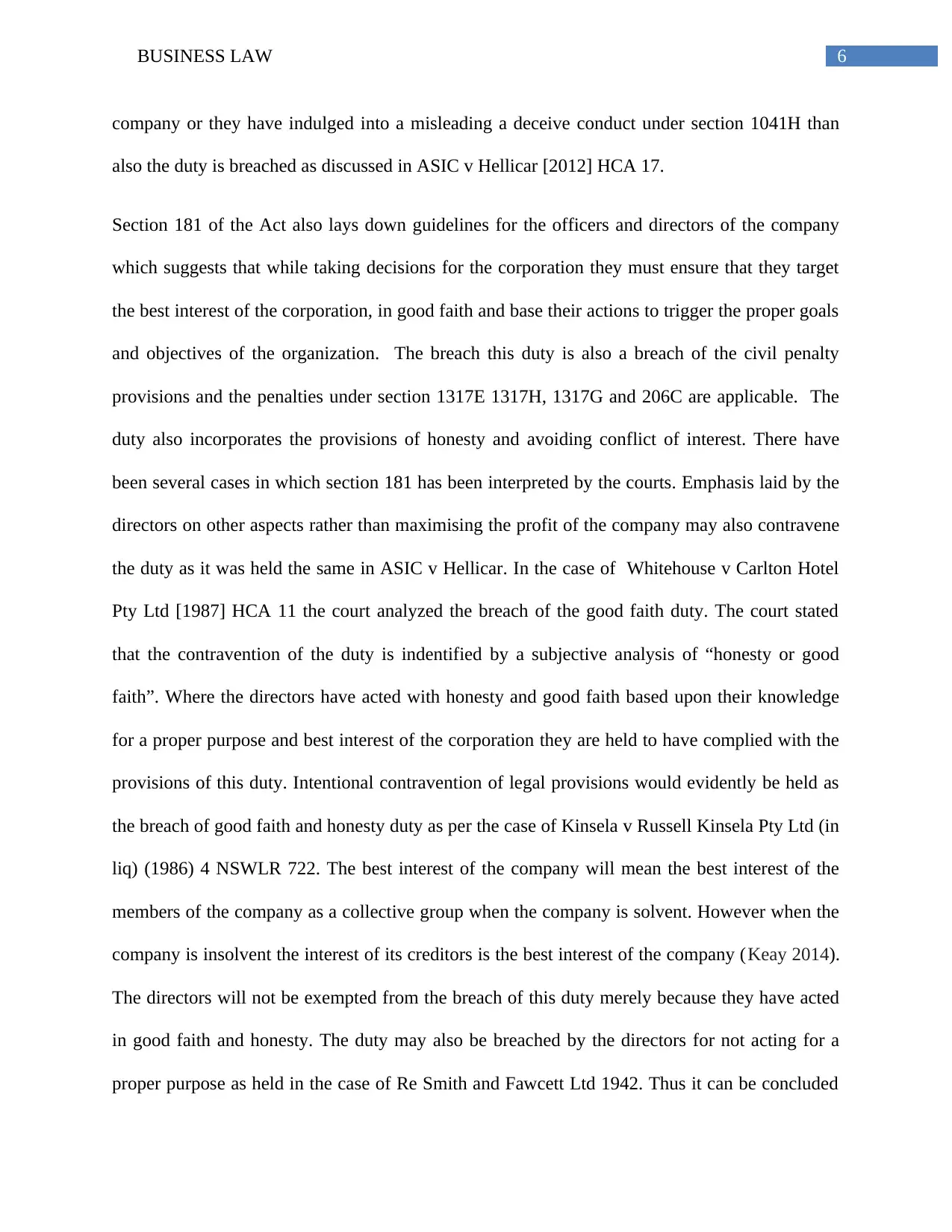
6BUSINESS LAW
company or they have indulged into a misleading a deceive conduct under section 1041H than
also the duty is breached as discussed in ASIC v Hellicar [2012] HCA 17.
Section 181 of the Act also lays down guidelines for the officers and directors of the company
which suggests that while taking decisions for the corporation they must ensure that they target
the best interest of the corporation, in good faith and base their actions to trigger the proper goals
and objectives of the organization. The breach this duty is also a breach of the civil penalty
provisions and the penalties under section 1317E 1317H, 1317G and 206C are applicable. The
duty also incorporates the provisions of honesty and avoiding conflict of interest. There have
been several cases in which section 181 has been interpreted by the courts. Emphasis laid by the
directors on other aspects rather than maximising the profit of the company may also contravene
the duty as it was held the same in ASIC v Hellicar. In the case of Whitehouse v Carlton Hotel
Pty Ltd [1987] HCA 11 the court analyzed the breach of the good faith duty. The court stated
that the contravention of the duty is indentified by a subjective analysis of “honesty or good
faith”. Where the directors have acted with honesty and good faith based upon their knowledge
for a proper purpose and best interest of the corporation they are held to have complied with the
provisions of this duty. Intentional contravention of legal provisions would evidently be held as
the breach of good faith and honesty duty as per the case of Kinsela v Russell Kinsela Pty Ltd (in
liq) (1986) 4 NSWLR 722. The best interest of the company will mean the best interest of the
members of the company as a collective group when the company is solvent. However when the
company is insolvent the interest of its creditors is the best interest of the company (Keay 2014).
The directors will not be exempted from the breach of this duty merely because they have acted
in good faith and honesty. The duty may also be breached by the directors for not acting for a
proper purpose as held in the case of Re Smith and Fawcett Ltd 1942. Thus it can be concluded
company or they have indulged into a misleading a deceive conduct under section 1041H than
also the duty is breached as discussed in ASIC v Hellicar [2012] HCA 17.
Section 181 of the Act also lays down guidelines for the officers and directors of the company
which suggests that while taking decisions for the corporation they must ensure that they target
the best interest of the corporation, in good faith and base their actions to trigger the proper goals
and objectives of the organization. The breach this duty is also a breach of the civil penalty
provisions and the penalties under section 1317E 1317H, 1317G and 206C are applicable. The
duty also incorporates the provisions of honesty and avoiding conflict of interest. There have
been several cases in which section 181 has been interpreted by the courts. Emphasis laid by the
directors on other aspects rather than maximising the profit of the company may also contravene
the duty as it was held the same in ASIC v Hellicar. In the case of Whitehouse v Carlton Hotel
Pty Ltd [1987] HCA 11 the court analyzed the breach of the good faith duty. The court stated
that the contravention of the duty is indentified by a subjective analysis of “honesty or good
faith”. Where the directors have acted with honesty and good faith based upon their knowledge
for a proper purpose and best interest of the corporation they are held to have complied with the
provisions of this duty. Intentional contravention of legal provisions would evidently be held as
the breach of good faith and honesty duty as per the case of Kinsela v Russell Kinsela Pty Ltd (in
liq) (1986) 4 NSWLR 722. The best interest of the company will mean the best interest of the
members of the company as a collective group when the company is solvent. However when the
company is insolvent the interest of its creditors is the best interest of the company (Keay 2014).
The directors will not be exempted from the breach of this duty merely because they have acted
in good faith and honesty. The duty may also be breached by the directors for not acting for a
proper purpose as held in the case of Re Smith and Fawcett Ltd 1942. Thus it can be concluded
Paraphrase This Document
Need a fresh take? Get an instant paraphrase of this document with our AI Paraphraser
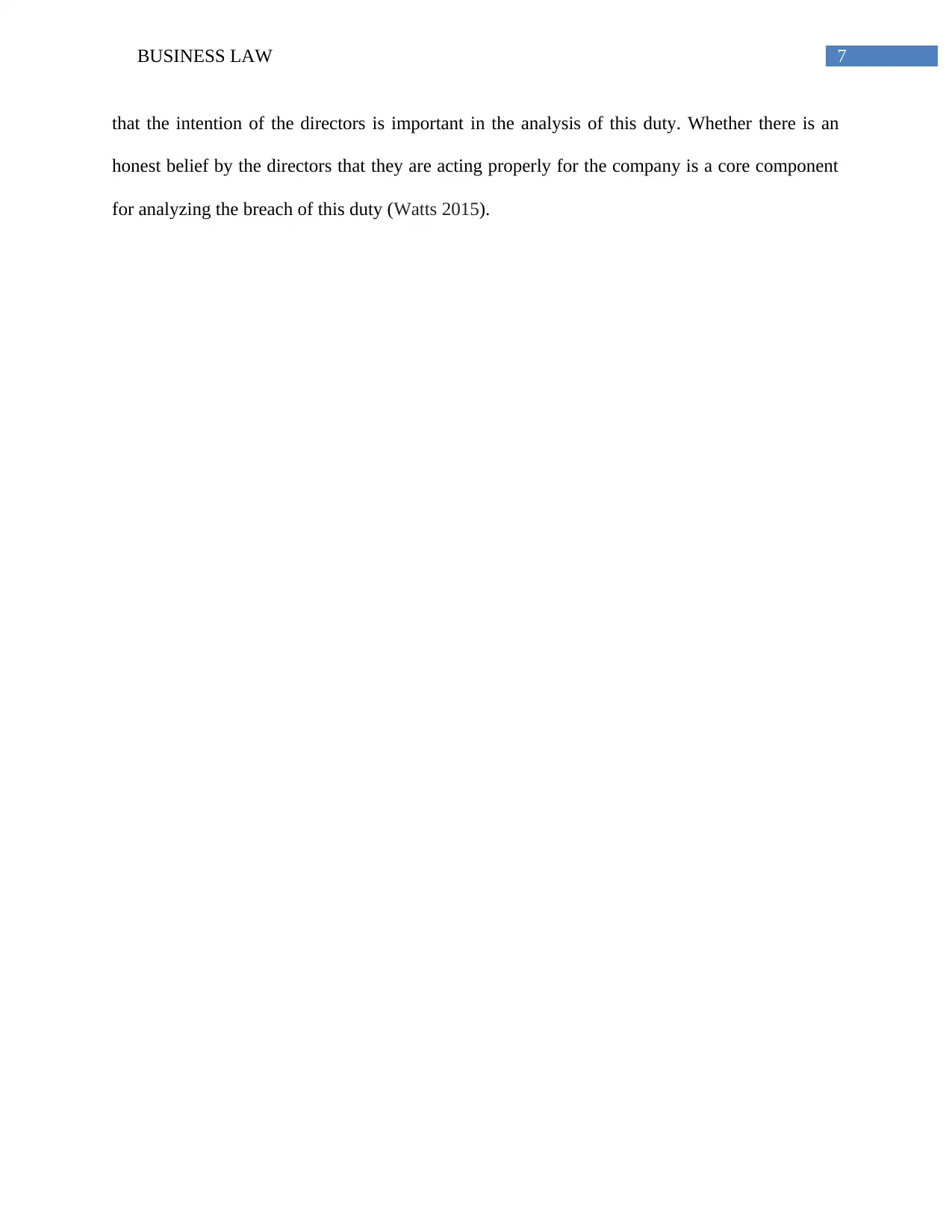
7BUSINESS LAW
that the intention of the directors is important in the analysis of this duty. Whether there is an
honest belief by the directors that they are acting properly for the company is a core component
for analyzing the breach of this duty (Watts 2015).
that the intention of the directors is important in the analysis of this duty. Whether there is an
honest belief by the directors that they are acting properly for the company is a core component
for analyzing the breach of this duty (Watts 2015).
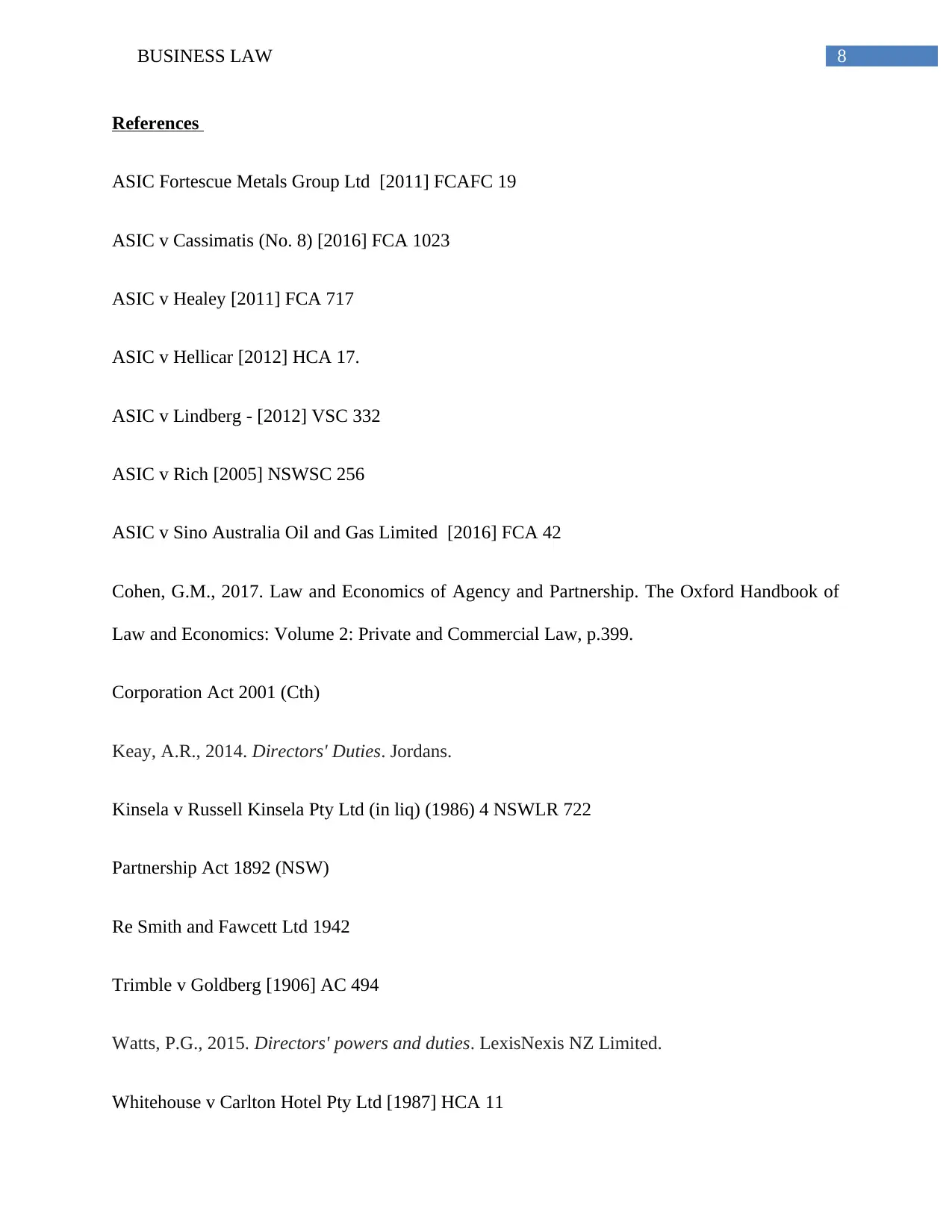
8BUSINESS LAW
References
ASIC Fortescue Metals Group Ltd [2011] FCAFC 19
ASIC v Cassimatis (No. 8) [2016] FCA 1023
ASIC v Healey [2011] FCA 717
ASIC v Hellicar [2012] HCA 17.
ASIC v Lindberg - [2012] VSC 332
ASIC v Rich [2005] NSWSC 256
ASIC v Sino Australia Oil and Gas Limited [2016] FCA 42
Cohen, G.M., 2017. Law and Economics of Agency and Partnership. The Oxford Handbook of
Law and Economics: Volume 2: Private and Commercial Law, p.399.
Corporation Act 2001 (Cth)
Keay, A.R., 2014. Directors' Duties. Jordans.
Kinsela v Russell Kinsela Pty Ltd (in liq) (1986) 4 NSWLR 722
Partnership Act 1892 (NSW)
Re Smith and Fawcett Ltd 1942
Trimble v Goldberg [1906] AC 494
Watts, P.G., 2015. Directors' powers and duties. LexisNexis NZ Limited.
Whitehouse v Carlton Hotel Pty Ltd [1987] HCA 11
References
ASIC Fortescue Metals Group Ltd [2011] FCAFC 19
ASIC v Cassimatis (No. 8) [2016] FCA 1023
ASIC v Healey [2011] FCA 717
ASIC v Hellicar [2012] HCA 17.
ASIC v Lindberg - [2012] VSC 332
ASIC v Rich [2005] NSWSC 256
ASIC v Sino Australia Oil and Gas Limited [2016] FCA 42
Cohen, G.M., 2017. Law and Economics of Agency and Partnership. The Oxford Handbook of
Law and Economics: Volume 2: Private and Commercial Law, p.399.
Corporation Act 2001 (Cth)
Keay, A.R., 2014. Directors' Duties. Jordans.
Kinsela v Russell Kinsela Pty Ltd (in liq) (1986) 4 NSWLR 722
Partnership Act 1892 (NSW)
Re Smith and Fawcett Ltd 1942
Trimble v Goldberg [1906] AC 494
Watts, P.G., 2015. Directors' powers and duties. LexisNexis NZ Limited.
Whitehouse v Carlton Hotel Pty Ltd [1987] HCA 11
1 out of 9
Related Documents
Your All-in-One AI-Powered Toolkit for Academic Success.
+13062052269
info@desklib.com
Available 24*7 on WhatsApp / Email
![[object Object]](/_next/static/media/star-bottom.7253800d.svg)
Unlock your academic potential
© 2024 | Zucol Services PVT LTD | All rights reserved.




